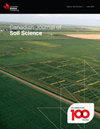对加拿大土壤分类系统的修订建议:扩大土壤分类标准以适用于非森林土壤
IF 1.5
4区 农林科学
Q4 SOIL SCIENCE
引用次数: 3
摘要
在加拿大土壤分类系统(CSSC)第一版(1974年)中,LFH有机层的分类标准允许应用于在不完全到良好排水条件下开发的任何土壤和土地利用。然而,在CSSC第三版(1998年)中,较窄的LFH层的分类标准限制了仅适用于森林土壤。对加拿大各地的一些土壤科学家进行了一项有限的调查,询问他们是否观察过非森林土壤中的LFH地平线。在加拿大各地的农业中,例如在免耕地、驯化和原生牧场以及开垦的土壤中,可以观察到不同的LFH水平。在城市地区,如高尔夫球场和草地娱乐场也发现了它们。在加拿大的其他非森林土地用途下,LFH视界也可能得到发展。由于免耕和原生和驯养牧场在大草原上占主导地位,因此该地区的LFH视界潜力比其他地区最大。然而,它们可能出现在加拿大的任何地方,积累超过有机物的分解,它们含有超过17%的有机碳重量或30%的有机物。因此,我们建议修订和扩大应用LFH水平的分类标准,以包括非森林土壤,并适用于加拿大境内的任何土壤目(如相关),并由实地土壤学家自行决定。随着时间的推移,确定和监测地表下陷面是至关重要的,因为它们对土壤健康、气候变化、温室气体、碳固存、养分循环、土壤侵蚀和水文学都很重要。本文章由计算机程序翻译,如有差异,请以英文原文为准。
Proposed revision to Canadian System of Soil Classification: broaden taxonomic criteria for applying LFH horizons to include nonforest soils
Abstract In the first edition (1974) of Canadian System of Soil Classification (CSSC), the taxonomic criteria for LFH organic horizons allowed application to any soil and land use developed under imperfectly to well-drained conditions. However, in the third edition (1998) of CSSC, the narrower taxonomic criteria for LFH horizons restricted application to only forest soils. A limited survey was conducted of some soil scientists across Canada to ask them if they had observed LFH horizons in nonforest soils. Distinct LFH horizons were observed across Canada under agriculture such as in no-till fields, tame and native pastures, and in reclaimed soils. They have also been observed in urban areas such as golf courses and grass-recreation fields. LFH horizons could also potentially develop under other nonforest land uses across Canada. Since no-till and native and tame pastures are most dominant in the prairies, the potential for LFH horizons is greatest in this region than elsewhere. However, they may occur anywhere in Canada where accumulation exceeds decomposition of organic material and they contain more than 17% organic carbon by weight or 30% organic matter. Therefore, we propose that the taxonomic criteria for applying LFH horizons be revised and broadened to include nonforest soils and be applicable to any soil order (where relevant) within Canada, and be at the discretion of the field pedologist. It is critical to identify and monitor LFH horizons over time because they are important for soil health, climate change, greenhouse gases, carbon sequestration, nutrient cycling, soil erosion, and hydrology.
求助全文
通过发布文献求助,成功后即可免费获取论文全文。
去求助
来源期刊

Canadian Journal of Soil Science
农林科学-土壤科学
CiteScore
2.90
自引率
11.80%
发文量
73
审稿时长
6.0 months
期刊介绍:
The Canadian Journal of Soil Science is an international peer-reviewed journal published in cooperation with the Canadian Society of Soil Science. The journal publishes original research on the use, management, structure and development of soils and draws from the disciplines of soil science, agrometeorology, ecology, agricultural engineering, environmental science, hydrology, forestry, geology, geography and climatology. Research is published in a number of topic sections including: agrometeorology; ecology, biological processes and plant interactions; composition and chemical processes; physical processes and interfaces; genesis, landscape processes and relationships; contamination and environmental stewardship; and management for agricultural, forestry and urban uses.
 求助内容:
求助内容: 应助结果提醒方式:
应助结果提醒方式:


